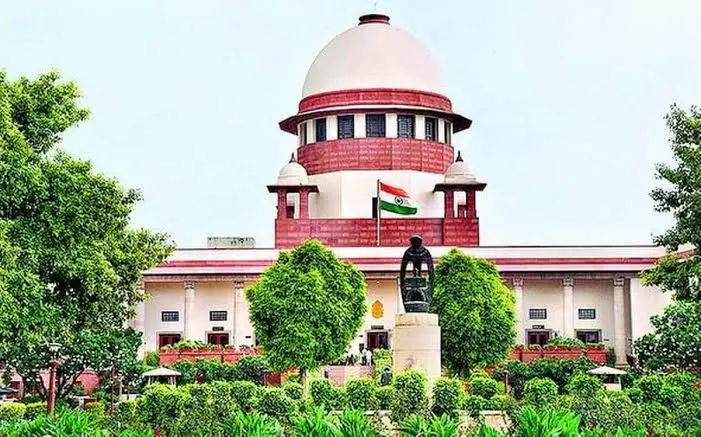Eye on elections: SC disposes of PIL about discrepancy in preparing electoral rolls
The ECI highlighted the efforts undertaken to maintain a pure, healthy, and inclusive electoral roll, adhering to constitutional provisions
By Sulogna Mehta
New Delhi: The Supreme Court has disposed of a Public Interest Litigation (PIL) about discrepancies in the electoral rolls prepared by the Election Commission of India (ECI).
Filed by Samvidhan Bachao Trust, the petitioner had sought the intervention of the apex court to ensure compliance with the constitutional mandate of Article 324 of the Constitution for error-free preparation of the electoral roll. The petitioner had urged in the said petition to direct the ECI to prepare of a revised electoral roll as per Article 324 of the Constitution and Instruction No. 23/2023-ERS dated May 29, 2023, by the ECI.
It had also asked for the preparation of the Electoral roll under Section 22 of the Representation of People Act, 1950, and Instruction No. 23/INST/2023-ERS for deletion of entries in cases of shifting, demographic similarity, death and also non-forceful deletion of permanent voters without issuing proper notice by the ECI. It had also asked for quashing or setting aside Instruction No. 23/BLA/2023-ERS regarding the appointment of Booth Level Agents and preparation of an accurate electoral roll for the forthcoming Parliament Election in 2024.
ECI’s response
In a detailed response, the Election Commission of India (ECI) highlighted the comprehensive efforts undertaken to maintain a pure, healthy, and inclusive electoral roll, adhering to constitutional provisions and legal frameworks. The Commission mentioned taking all efforts to make the electoral roll pure, healthy, and inclusive within the given framework of the provision under Article 324 of the Constitution of India and the provision of the Representation of the People Act, 1950, and Registration of the Electors Rules, 1960 and the extant instructions issued by the Commission from time to time.
The electoral roll is prepared under the well-defined protocol and procedure and following the principle of natural justice by providing a reasonable opportunity to the electors and all stakeholders, political parties in particular, and in case of deletion, notice is issued and opportunity for filing an objection and hearing is given. The Commission ensures utmost transparency at each stage of revision of the roll so that people can beforehand check entries in the electoral roll and can file any claim or objection, to avoid any post facto objection or grievances. ECI has provided the provision of the appointment of Booth Level Agents (BLA) by the recognized political parties as an equal opportunity & extra facilitation to them ensuring utmost transparency in the process.
Process for preparation and revision of electoral roll
ECI stated that Section 21 provides that the roll will be prepared before each election, however, with an objective of purification of electoral roll and giving adequate opportunity to all unenrolled eligible persons to get their names registered in the electoral roll, ECI conducts regular Special Summary Revision (SSR) of electoral rolls every year. The Commission holds one annual SSR after which the electoral roll is published. At the time of SSR, the thorough exercise of house-to-house verification and identification of unenrolled eligible electors and all electors who are no longer eligible to remain in the electoral roll is done during the pre-revision period. Advance applications of all citizens who will be eligible for enrolment for about three subsequent qualifying dates are also invited. These advance applications are processed in the relevant quarters by the EROs. Between two qualifying dates, the roll is continuously updated and the addition of left-out voters, deletion, and modification due to shifting/duplicate entries and death are done by electoral authorities. Thus, an electoral roll is constantly updated throughout the year. Only during the election period, this updating process is suspended for a brief period from the last date of filing nomination to the completion of the election, when the roll is frozen given the provision of Section 23(3) of RPA 1950.
A robust IT-enabled system for identification of probable multiple/duplicate entries (Demographic Similar Entries and Photo Similar Entries) is also in place to provide lists of such entries to EROs to act upon after following due procedure.
Confirmed cases of DSEs/PSEs, permanently Shifted and Deceased are removed only after Form-7 is received from the electors (in case of DSEs, PSEs, Permanently Shifted) and near relative/family member (in case of deceased). Notice must be served to the concerned person to remove the entries
The Commission makes all possible efforts to provide opportunities to all eligible citizens to get themselves enrolled in the electoral rolls. Special focus is given to the marginalized sections of society having less rate of enrollment, females, PwD, third genders, Tribes (especially the Particularly Vulnerable Tribal Groups), etc.
As per the finally published electoral roll after SSR 2024, a total of 96,85,01,358 electors are enrolled. Of them 49,70,78,791 are male and 47,13,74,510 are female electors.